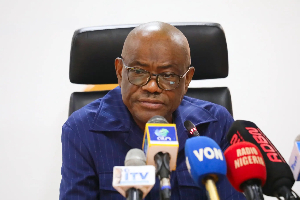Business News of Friday, 20 November 2020
Source: guardian.ng
Nigerians will tolerate higher prices to have lower interest rates - Survey
A survey by the Central Bank of Nigeria (CBN) has revealed that Nigerians, given a trade-off, are willing to pay more for goods and services to have lower interest rates.
The preference as contained in the ‘Q3 Inflation Attitude Survey Report’ released yesterday, shows that Nigerians are still comfortable with the impact of rising prices. It is the price they are willing to pay for a lower interest rate needed to boost production and create more jobs.
The survey question was based on the notion that there is an inverse relationship between inflation and interest rate. A lower interest rate increases economic activities and boosts aggregate demand, leading to a steeper inflation rate.
On the other hand, a higher interest stifles growth and reduces the purchasing power of the majority of consumers, leading to a deceleration in the inflation rate.
The relationship between inflation and interest is a major employment planning tool for policymakers.
The apex bank said the survey conducted from September 21 to 30, shows that the majority of Nigerians would tolerate the accelerating inflation rate as a sacrifice for a more buoyant economy that will create the needed jobs. Unemployment plus underemployment rate was above 50 per cent as of June 2020.
“Respondents were asked to choose between raising interest rates to keep inflation down and keeping interest rates down to allow prices to rise. Responding, 25.6 per cent preferred interest rates to rise to keep inflation down while 43.3 per cent said they would prefer prices to rise faster, 31.1 per cent of the respondents had no idea.
“These responses suggest that given a trade-off, more of the respondents would prefer higher interest rates than higher inflation, which is suggestive of the respondent households’ support for the Bank’s price stability objective,” the survey points out.
It, however, says the majority of the respondents (62.1 per cent) believe that the economy will become increasingly weaker if prices of goods and services rise faster than they currently do – a kind of contradiction. The response, the CBN believes, is a vote of confidence on its price stability objective.
It notes that 73.7 per cent of those surveyed fee that prices had risen by at least 3.0 per cent in the past 12 months.
It adds, “The median expectation of price changes over the next 12 months was that prices would inch up by 4 per cent. From the total responses, 59.7 per cent of the respondents expected prices to rise by at least 3 per cent over the next 12 months, 21.8 per cent expected prices to increase by more than one per cent but less than 3 per cent. However, 16.4 per cent of the respondents were optimistic that prices over the next 12 months would either decline or remain the same.”
The report also notes that the majority of Nigerians have rather shallow knowledge about the operation and independence of the Monetary Policy Committee (MPC), whose decisions they believe are influenced by the government and the Federal Ministry of Finance.
The survey on the thorny issues around interest rate and inflation comes a few days after the National Bureau of Statistics (NBS) released the October consumer Price Index (CPI), a metric showing the rise in prices of goods and services consumed by the people over time.
According to the latest index, Nigeria’s headline inflation hit 14.23 in October, surpassing the Central Bank’s 14 per cent prediction by the end of the year. The month-on-month inflation rate has remained positive in the past 34 months, sending a worrisome signal about the living condition of Nigerians.
MPC members had admitted in September that the rising inflation rate was a major concern. Next week when the committee holds the last meeting of the year, interest rate and inflation will certainly be the two top talking points.












